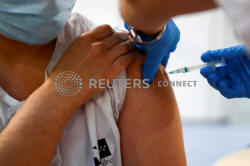 Fraudsters
offer 400 million 'ghost' COVID vaccines in EU:
officials Fraudsters
offer 400 million 'ghost' COVID vaccines in EU:
officials
 Send a link to a friend
Send a link to a friend
[February 25, 2021]
BERLIN/BRUSSELS (Reuters) - Fraudsters have
offered 400 million doses of COVID-19 vaccines worth some 3 billion
euros to European Union countries, two officials, showing how criminals
seek to capitalise on a botched inoculation campaign weighing on the
bloc's economic recovery.
|
|
 EU leaders will discuss by videoconference on Thursday how to
protect their 450 million citizens from new, more contagious
variants of the coronavirus, ensure stable vaccine deliveries, ramp
up production and update jabs to counter new strains. EU leaders will discuss by videoconference on Thursday how to
protect their 450 million citizens from new, more contagious
variants of the coronavirus, ensure stable vaccine deliveries, ramp
up production and update jabs to counter new strains.
Two officials with the bloc's executive European Commission
estimated that around 400 million doses of "ghost" vaccine had been
offered by fraudsters at a price of up to 3 billion euros ($3.67
billion).
"There is a really large quantity," one said. "Nobody has any idea
what is actually in these vials...The best case is it's just not
working, in the worst case it's a very serious issue."

The official, who noted that most of the shots offered to EU
governments by traders were purportedly the AstraZeneca vaccine,
compared the situation to the start of the coronavirus pandemic in
early 2020 when criminal exploited a shortage of masks and other
protective equipment.
[to top of second column] |
 A second official, who also
spoke on condition of anonymity, said the
Commission was worried about "ghost" vaccines.
"It is unclear whether these are genuine vaccine
doses or if we are just talking about salt water
in small vials," the official told Reuters.
The EU had warned already that vaccine fraud was
on the rise, with fake doses circulating on the
market, but the extent of the problem has been
unclear until now.
(Reporting by Sabine Siebold, John Chalmers,
Writing by Gabriela Baczynska; Editing by Mark
Heinrich)
[© 2021 Thomson Reuters. All rights
reserved.] Copyright 2021 Reuters. All rights reserved. This material may not be published,
broadcast, rewritten or redistributed.
Thompson Reuters is solely responsible for this content |